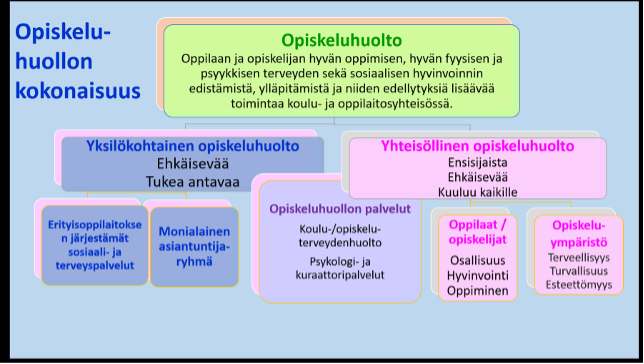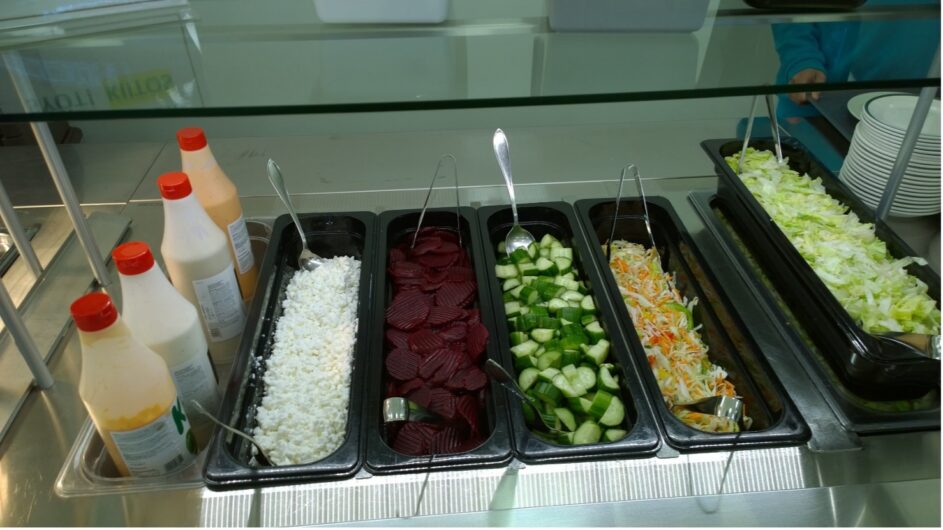Student services

The aim is to create a safe, healthy and comfortable working environment and to support and help students to adjust to school life. It requires the cooperation of all those working in the school. This includes school meals, school transport, counselling, psychosocial services, school dental care and school health care.
Student support can be divided into individual and community support. The emphasis is on preventive action. The city’s student care plan, approved by the Future Committee on 27 June 2023, can be found behind this link and provides more detailed information on student care in the city of Kemijärvi.
Welfare group
The school holds regular meetings of a school-specific well-being group, which consists of the school’s key student welfare actors. The group’s role is to evaluate and develop the school’s student welfare services. The group does not deal with student-specific issues, but always sets up a student-specific expert group, the composition of which is agreed with the student’s parents. The guardian is always part of the group when his/her child’s issues are discussed.

School counsellors
With the curator, the student can discuss issues that are bothering him or her. This could be issues related to school, personal life or leisure time, for example.
The curator also works with parents. For them, the curator can be a support in educational matters and a partner in dealing with school issues.
The school curator Essi Maaninka-Mäkinen (040 705 8592) is available at the school every day and is responsible for all other pupils except those in small groups A, B and C, who are the responsibility of curator Riitta Vartioniemi-Iso-Heiko(040 539 6798).
Psychological services
For example, the school psychologist conducts learning assessments for pupils and consults teachers and carers.
The school psychologist this academic year is Saara Suomalainen. She is available about once a month. Appointments are made through the comprehensive special education teachers.
School psychologist services are also available through the Lapponian Family and Mental Health Clinic.
School health services
Health nurses meet with pupils every year. Comprehensive health checks, including medical examinations and questionnaires, are carried out in the first, fifth and eighth grades. Guardians accompany the pupils to the medical examinations.
School nurse Johanna Löf(040 683 5286) is available at the school on Mondays and Tuesdays and every other week on Fridays. She is responsible for grades 1-6 and for pupils attending upper secondary school.
Anu Rae-Lahtela(040 024 5196) is available on Wednesdays and Thursdays and every other week on Fridays. She is responsible for grades 7-9.
Preventing absenteeism through early support
Absenteeism can be an indicator of different challenges. It can be related to school or learning, school travel, relationships with friends, health or family situation. Tackling absenteeism can break the cycle of exclusion. Early support is more likely to help the student and reverse the trend.
An Early Support for Ab sence Policy has been developed to prevent, intervene and monitor absenteeism. It is also included in the city’s student support plan (page 16 – chapter 2.5)
The class teacher and the subject teacher keep track of their students’ absences.
School meals

School meals are part of student welfare and at the same time part of school education and teaching. The main objective of school meals is to maintain the health and work performance of pupils. On average, one third of the daily nutritional requirements meet these main objectives and a school meal is considered to provide 1/3 of the daily nutritional requirements. School meals should complement the food a pupil eats at home, provide guidance on healthy eating, develop food and taste habits and teach eating habits. Special diets are provided to pupils who need them, on the basis of notification to the kitchen by parents and the school nurse.
The snack is served at the end of the school day at 15.00. Lower classes receive a snack at 13.00 and upper classes at 14.00.
If parents and/or pupils have any questions about school meals, they can contact the school kitchen staff. The person in charge of the kitchen is Aune Tornberg (040 5395 171).

